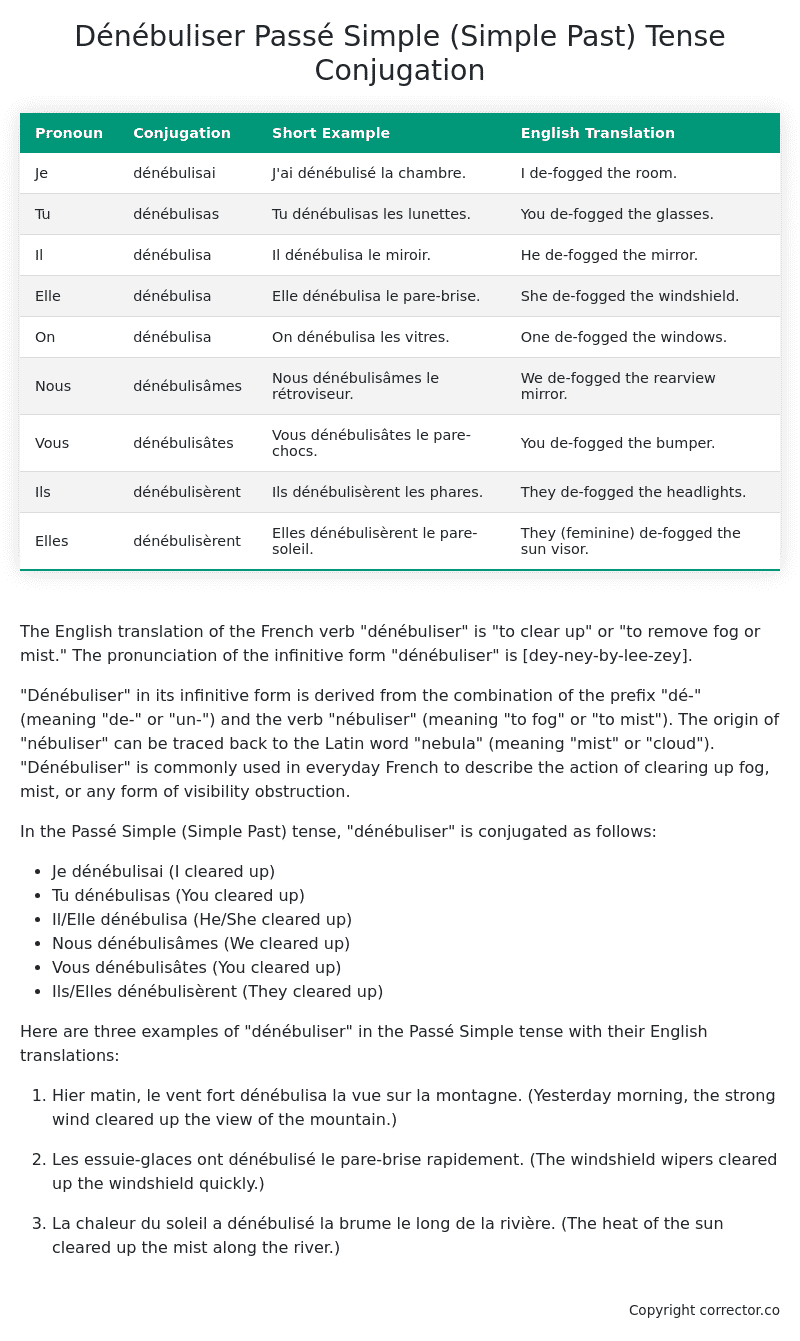Passé Simple (Simple Past) Tense Conjugation of the French Verb dénébuliser
Introduction to the verb dénébuliser
The English translation of the French verb “dénébuliser” is “to clear up” or “to remove fog or mist.” The pronunciation of the infinitive form “dénébuliser” is [dey-ney-by-lee-zey].
“Dénébuliser” in its infinitive form is derived from the combination of the prefix “dé-” (meaning “de-” or “un-“) and the verb “nébuliser” (meaning “to fog” or “to mist”). The origin of “nébuliser” can be traced back to the Latin word “nebula” (meaning “mist” or “cloud”). “Dénébuliser” is commonly used in everyday French to describe the action of clearing up fog, mist, or any form of visibility obstruction.
In the Passé Simple (Simple Past) tense, “dénébuliser” is conjugated as follows:
- Je dénébulisai (I cleared up)
- Tu dénébulisas (You cleared up)
- Il/Elle dénébulisa (He/She cleared up)
- Nous dénébulisâmes (We cleared up)
- Vous dénébulisâtes (You cleared up)
- Ils/Elles dénébulisèrent (They cleared up)
Here are three examples of “dénébuliser” in the Passé Simple tense with their English translations:
-
Hier matin, le vent fort dénébulisa la vue sur la montagne.
(Yesterday morning, the strong wind cleared up the view of the mountain.) -
Les essuie-glaces ont dénébulisé le pare-brise rapidement.
(The windshield wipers cleared up the windshield quickly.) -
La chaleur du soleil a dénébulisé la brume le long de la rivière.
(The heat of the sun cleared up the mist along the river.)
Table of the Passé Simple (Simple Past) Tense Conjugation of dénébuliser
| Pronoun | Conjugation | Short Example | English Translation |
|---|---|---|---|
| Je | dénébulisai | J’ai dénébulisé la chambre. | I de-fogged the room. |
| Tu | dénébulisas | Tu dénébulisas les lunettes. | You de-fogged the glasses. |
| Il | dénébulisa | Il dénébulisa le miroir. | He de-fogged the mirror. |
| Elle | dénébulisa | Elle dénébulisa le pare-brise. | She de-fogged the windshield. |
| On | dénébulisa | On dénébulisa les vitres. | One de-fogged the windows. |
| Nous | dénébulisâmes | Nous dénébulisâmes le rétroviseur. | We de-fogged the rearview mirror. |
| Vous | dénébulisâtes | Vous dénébulisâtes le pare-chocs. | You de-fogged the bumper. |
| Ils | dénébulisèrent | Ils dénébulisèrent les phares. | They de-fogged the headlights. |
| Elles | dénébulisèrent | Elles dénébulisèrent le pare-soleil. | They (feminine) de-fogged the sun visor. |
Other Conjugations for Dénébuliser.
Le Present (Present Tense) Conjugation of the French Verb dénébuliser
Imparfait (Imperfect) Tense Conjugation of the French Verb dénébuliser
Passé Simple (Simple Past) Tense Conjugation of the French Verb dénébuliser (You’re reading it right now!)
Passé Composé (Present Perfect) Tense Conjugation of the French Verb dénébuliser
Futur Simple (Simple Future) Tense Conjugation of the French Verb dénébuliser
Futur Proche (Near Future) Tense Conjugation of the French Verb dénébuliser
Plus-que-parfait (Pluperfect) Tense Conjugation of the French Verb dénébuliser
Passé Antérieur (Past Anterior) Tense Conjugation of the French Verb dénébuliser
Futur Antérieur (Future Anterior) Tense Conjugation of the French Verb dénébuliser
Subjonctif Présent (Subjunctive Present) Tense Conjugation of the French Verb dénébuliser
Subjonctif Passé (Subjunctive Past) Tense Conjugation of the French Verb dénébuliser
Subjonctif Imparfait (Subjunctive Imperfect) Tense Conjugation of the French Verb dénébuliser
Conditionnel Présent (Conditional Present) Tense Conjugation of the French Verb dénébuliser
Conditionnel Passé (Conditional Past) Tense Conjugation of the French Verb dénébuliser
Conditionnel Passé II (Conditional Past II) Tense Conjugation of the French Verb dénébuliser
L’impératif Présent (Imperative Present) Tense Conjugation of the French Verb dénébuliser
L’impératif Passé (Imperative Past) Tense Conjugation of the French Verb dénébuliser
L’infinitif Présent (Infinitive Present) Tense Conjugation of the French Verb dénébuliser
L’infinitif Passé (Infinitive Past) Tense Conjugation of the French Verb dénébuliser
Le Participe Présent (Present Participle) Tense Conjugation of the French Verb dénébuliser
Le Participe Passé (Past Participle) Tense Conjugation of the French Verb dénébuliser
Struggling with French verbs or the language in general? Why not use our free French Grammar Checker – no registration required!
Get a FREE Download Study Sheet of this Conjugation 🔥
Simply right click the image below, click “save image” and get your free reference for the dénébuliser Passé Simple tense conjugation!

Dénébuliser – About the French Passé Simple (Simple Past) Tense
Formation
Usage
Narration
Historical Context
Interactions with other tenses
Passé Composé
Imparfait
Conditional and Subjunctive
Summary
I hope you enjoyed this article on the verb dénébuliser. Still in a learning mood? Check out another TOTALLY random French verb conjugation!


